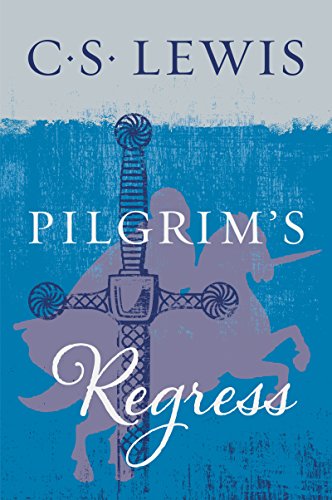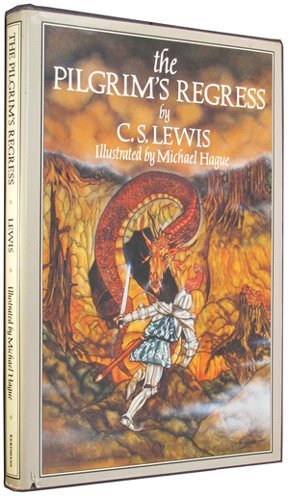-
The Pilgrim's Regress
C. S. Lewis, Simon Vance, Blackstone Audio, Inc.
Audible Audiobook (Blackstone Audio, Inc., May 13, 2005)The first book written by C. S. Lewis after his conversion, The Pilgrim's Regress is, in a sense, a record of Lewis' own search for meaning and spiritual satisfaction that eventually led him to Christianity. It is the story of John and his odyssey to an enchanting island that has created in him an intense longing, a mysterious, sweet desire. John's pursuit of this desire takes him through adventures with such people as Mr. Enlightenment, Media Halfways, Mr. Mammon, Mother Kirk, Mr. Sensible, and Mr. Humanist and through such cities as Thrill and Eschropolis, as well as the Valley of Humiliation. Though the dragons and giants here are different from those in Bunyan's The Pilgrim's Progress, Lewis' allegory performs the same function of enabling the author to say in fable form what would otherwise have demanded a full-length philosophy of religion.
-
The Pilgrim's Regress
C. S. Lewis
eBook (HarperOne, May 20, 2014)The first book written by C. S. Lewis after his conversion, The Pilgrim's Regress is, in a sense, the record of Lewis's own search for meaning and spiritual satisfaction—a search that eventually led him to Christianity.Here is the story of the pilgrim John and his odyssey to an enchanting island which has created in him an intense longing; a mysterious, sweet desire. John's pursuit of this desire takes him through adventures with such people as Mr. Enlightenment, Media Halfways, Mr. Mammon, Mother Kirk, Mr. Sensible, and Mr. Humanist and through such cities as Thrill and Eschropolis as well as the Valley of Humiliation.Though the dragons and giants here are different from those in Bunyan's Pilgrim's Progress, Lewis's allegory performs the same function of enabling the author to say simply and through fantasy what would otherwise have demanded a full-length philosophy of religion.
-
The Pilgrim's Regress
C. S. Lewis
Paperback (Eerdmans, Oct. 22, 2014)The first book written by C. S. Lewis after his conversion to Christianity, The Pilgrim's Regress is, in a sense, a record of Lewis's own search for meaning and spiritual satisfaction, a search that eventually led him to Christianity.Here is the story of the pilgrim John and his odyssey to an enchanting island that creates in him an intense longing -- a mysterious, sweet desire. John's pursuit of this desire takes him through adventures with such people as Mr. Enlightenment, Mr. Mammon, Mother Kirk, and Mr. Sensible and through such cities as Thrill and Eschropolis -- and through the Valley of Humiliation.Though the dragons and giants here are different from those in Bunyan's Pilgrim's Progress, Lewis's allegory performs the same function of enabling the author to say with fantasy and simplicity what would otherwise have demanded a full-length philosophy of religion. In Lewis's skillful hands this fable becomes as effective a Christian apologia as Bunyan's.
-
The Pilgrim's Regress
C. S. Lewis, Michael Hague
Paperback (Wm. B. Eerdmans Publishing Co., Jan. 10, 1992)The first book written by C. S. Lewis after his conversion, The Pilgrim's Regress is, in a sense, the record of Lewis's own search for meaning and spiritual satisfaction -- a search that eventually led him to Christianity.Here is the story of the pilgrim John and his odyssey to an enchanting island which has created in him an intense longing 7mdash; a mysterious, sweet desire. John's pursuit of this desire takes him through adventures with such people as Mr. Enlightenment, Media Halfways, Mr. Mammon, Mother Kirk, Mr. Sensible, and Mr. Humanist and through such cities as Thrill and Eschropolis as well as the Valley of Humiliation.Though the dragons and giants here are different from those in Bunyan's Pilgrim's Progress, Lewis's allegory performs the same function of enabling the author to say simply and through fantasy what would otherwise have demanded a full-length philosophy of religion.
-
The Pilgrim's Regress: An Allegorical Apology for Christianity, Reason, and Romanticism
C. S Lewis, Michael Hague
Hardcover (Eerdmans, March 15, 1981)In this novel written within a year of his conversion, Lewis characterizes the various theological and temperamental leanings of different parts of the Church.
-
Pilgrim's Regress
C. S. Lewis
Mass Market Paperback (Bantam Books, Aug. 15, 1981)Publication Date: August 1981 One of C.S. Lewis's works of fiction, or more specifically allegory, this book is modelled upon Bunyan's "Pilgrim's Progress", as Lewis satirizes different sections of the Church. Included in the tale is the City of Claptrap, and the far-off marsh of the Theosophists.
-
Pilgrim's Regress, The
C. S. Lewis, Simon Vance
MP3 CD (Blackstone on Brilliance Audio, Sept. 4, 2018)The first book written by C. S. Lewis after his conversion, The Pilgrim's Regress is, in a sense, a record of Lewis' own search for meaning and spiritual satisfaction that eventually led him to Christianity. It is the story of John and his odyssey to an enchanting island that has created in him an intense longing, a mysterious, sweet desire. John's pursuit of this desire takes him through adventures with such people as Mr. Enlightenment, Media Halfways, Mr. Mammon, Mother Kirk, Mr. Sensible, and Mr. Humanist and through such cities as Thrill and Eschropolis, as well as the Valley of Humiliation. Though the dragons and giants here are different from those in Bunyan's The Pilgrim's Progress, Lewis' allegory performs the same function of enabling the author to say in fable form what would otherwise have demanded a full-length philosophy of religion.
-
The Pilgrim's Regress Lib/E: An Allegorical Apology for Christianity, Reason, and Romanticism
C S Lewis, Simon Vance
Audio CD (Blackstone Pub, March 1, 2001)The first book written by C. S. Lewis after his conversion, The Pilgrim's Regress is, in a sense, a record of Lewis' own search for meaning and spiritual satisfaction that eventually led him to Christianity. It is the story of John and his odyssey to an enchanting island that has created in him an intense longing, a mysterious, sweet desire. John's pursuit of this desire takes him through adventures with such people as Mr. Enlightenment, Media Halfways, Mr. Mammon, Mother Kirk, Mr. Sensible, and Mr. Humanist and through such cities as Thrill and Eschropolis, as well as the Valley of Humiliation. Though the dragons and giants here are different from those in Bunyan's The Pilgrim's Progress, Lewis' allegory performs the same function of enabling the author to say in fable form what would otherwise have demanded a full-length philosophy of religion. W
W
-
The Pilgrim's Regress: An Allegorical Apology for Christianity, Reason and Romanticism
C. S. Lewis
Paperback (Eerdmans, March 15, 1958)Here is the story of the pilgrim John and his odyssey to an enchanting island which has created in him an intense longing-a mysterious, sweet desire. John s pursuit of this desire takes him through adventures with such people as Mr. Enlightenment, Media Halfways, Mr. Mammon, Mother Kirk, Mr. Sensible, and Mr. Humanist and through such cities as Thrill and Eschropolis as well as the Valley of Humiliation. Though the dragons and giants here are different from those in Bunyan s Pilgrim s Progress, Lewis s allegory performs the same function of enabling the author to say simply and through fantasy what would otherwise have demanded a full-length philosophy of religion.
-
The Pilgrim's Regress
C S LEWIS
Paperback (William Collins, )BRAND NEW, Exactly same ISBN as listed, Please double check ISBN carefully before ordering.
-
Pilgrim's Regress
C. S. Lewis
Paperback (Eerdmans Pub Co, Sept. 1, 1981)The first book written by C. S. Lewis after his conversion,The Pilgrim's Regress is, in a sense, the record of Lewis's own search for meaning and spiritual satisfaction—a search that eventually led him to Christianity. Here is the story of the pilgrim John and his odyssey to an enchanting island which has created in him an intense longing—a mysterious, sweet desire. John's pursuit of this desire takes him through adventures with such people as Mr. Enlightenment, Media Halfways, Mr. Mammon, Mother Kirk, Mr. Sensible, and Mr. Humanist and through such cities as Thrill and Eschropolis as well as the Valley of Humiliation. Though the dragons and giants here are different from those in Bunyan's Pilgrim's Progress, Lewis's allegory performs the same function of enabling the author to say simply and through fantasy what would otherwise have demanded a full-length philosophy of
-
The Pilgrim's Regress
C.S. Lewis
Hardcover (Geoffrey Bles Ltd., March 15, 1956)The first book written by C. S. Lewis after his conversion, The Pilgrim's Regress is, in a sense, a record of Lewis' own search for meaning and spiritual satisfaction that eventually led him to Christianity. It is the story of John and his odyssey to an enchanting island that has created in him an intense longing, a mysterious, sweet desire. John's pursuit of this desire takes him through adventures with such people as Mr. Enlightenment, Media Halfways, Mr. Mammon, Mother Kirk, Mr. Sensible, and Mr. Humanist and through such cities as Thrill and Eschropolis, as well as the Valley of Humiliation. Though the dragons and giants here are different from those in Bunyan's The Pilgrim's Progress, Lewis' allegory performs the same function of enabling the author to say in fable form what would otherwise have demanded a full-length philosophy of religion.